Beyond Employee Engagement: 25 Ideas to Inspire Your People
While genius may be 1% inspiration and 99% perspiration, building a company employees truly love reverses the equation: it’s almost all inspiration.

What exactly is employee engagement?
It’s no secret. Employee engagement, particularly for global enterprise companies in our post-COVID era, is essential for sustained success and resilience. And by engagement, we mean the emotional commitment, motivation, and alignment employees have towards their work and the organization’s goals. Finding employee engagement ideas that foster inspirational levels of engagement is crucial for navigating the complexities of a rapidly evolving business landscape, where remote work, digital transformation, and shifting market dynamics are all prevalent.
That being said, Gallup reports that the number of actively engaged employees in the U.S. has been “stagnating” since peaking at just 36% in January of 2020. It now sits at 33%, with “actively disengaged” employees at 16%.
These figures have been a longstanding concern for C-level executives. And the disconnect they signify is only getting more worrisome in this era of remote working and rapid workplace transformation.
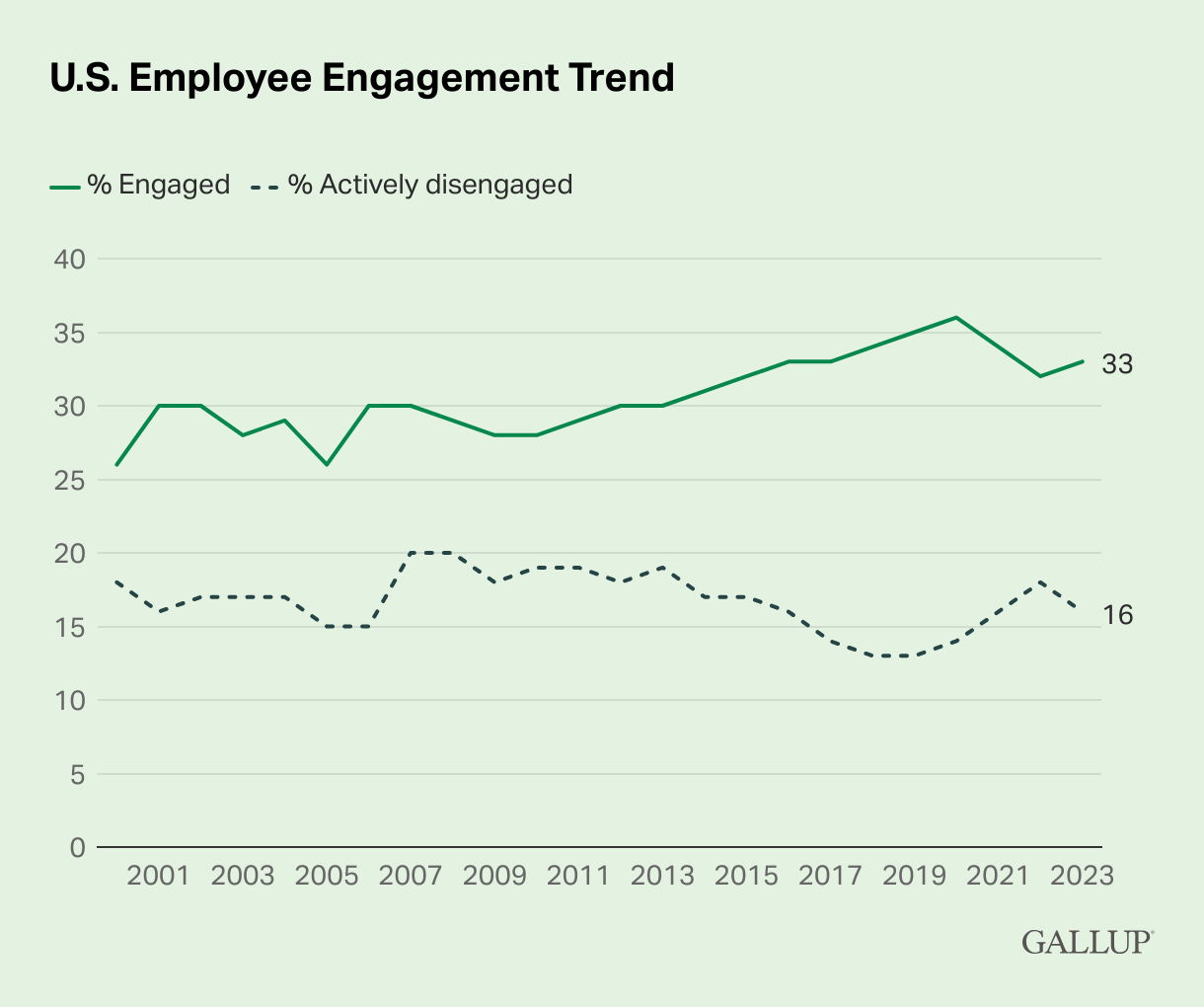
Why is employee engagement important?
Especially for today’s distributed workforce, strong employee engagement promotes a sense of belonging and connection, mitigating feelings of isolation and disconnection common among frontline and remote workers. Engaged employees are more adaptable, innovative, and customer-focused, driving performance and ensuring organizational agility.
But the fact that a third of today’s employees remain unengaged, if not actively disengaged, points to a serious, evolving problem. So what’s to be done?
Employee Engagement: An Executive Imperative
There are only three measurements that tell you nearly everything you need to know about your organization’s overall performance: employee engagement, customer satisfaction, and cash flow. It goes without saying that no company, small or large, can win over the long run without energized employees who believe in the mission and understand how to achieve it.”
Jack Welch, former CEO of GE
Prioritizing initiatives to enhance employee engagement seems like the obvious answer. Not only is it a strategic move, it’s essential for driving sustainable growth, innovation, and resilience in the face of challenges and uncertainties. Of course, many companies have been struggling to engage their people. So, are they doing something wrong?
What if organizations tried to do more than just engage employees. What if they tried to inspire them?
Engaged employees are clearly pivotal for organizational success. That being said, inspired employees transcend engagement, embodying a deeper sense of purpose, creativity, and innovation that drives transformative change and competitive advantage.
Aren’t engaged employees inspired employees?
Engaged employees are certainly more likely to be inspired, but the two aren’t necessarily synonymous.
Engagement refers to the level of commitment, passion, and enthusiasm employees have toward their work and their organization. When employees are engaged, they are more likely to go above and beyond in their roles, feel a sense of ownership over their work, and be committed to the organization’s goals and values.
Inspired employees, on the other hand, often go beyond engagement. They not only feel connected to their work and organization but they also experience a deeper sense of purpose and meaning in what they do. They are driven by a sense of vision, creativity, and passion that transcends mere task completion.
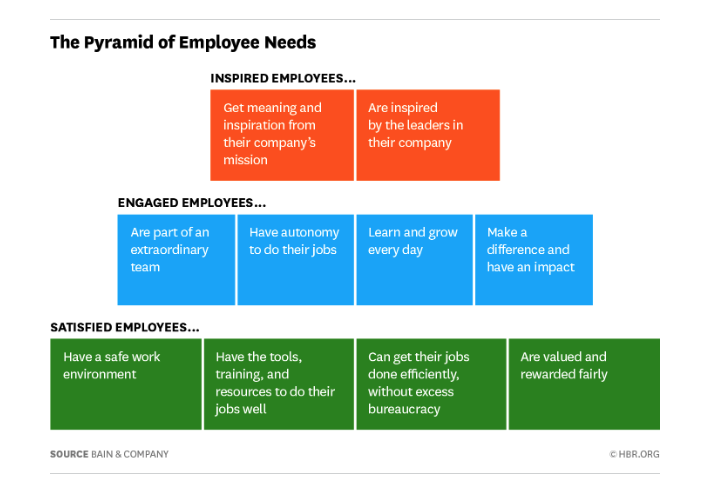 Inspired employees get meaning and inspiration from their company’s mission and leadership.
Inspired employees get meaning and inspiration from their company’s mission and leadership.
What are the benefits of inspired employees?
In an ideal scenario, engaged employees are likely to find inspiration in their work because engagement often involves factors like meaningful tasks, supportive work environments, and opportunities for growth and development — all of which can contribute to feelings of inspiration. However, inspiration can also come from personal values, intrinsic motivations, or external sources beyond the workplace.
So while engaged employees are more inclined to be inspired, it’s possible for someone to be engaged without necessarily feeling deeply inspired, and vice versa. What is true is that an inspired employee is more than 2x more productive than one who is merely satisfied.
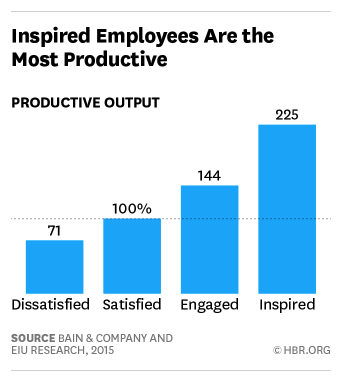
All of these reasons and more point to why it’s high time for leadership to aspire to inspire.
25 ideas for engaging and inspiring employees
1. Create a Positive Work Environment
It may seem obvious, but fostering a culture of respect, trust, and collaboration where employees feel valued and supported is the best way to engage and inspire your employees. That imperative was hard enough when employees were mostly sitting under one roof. But frontline and distributed workers have traditionally been left out in the cold. That brings us to another reality: You can’t engage people unless you can reach them. That’s why most of the following employee engagement ideas become much more possible with the aid of a mobile platform for employee communications.
2. Provide Opportunities for Growth
Offer training programs, skill-development workshops, and career advancement opportunities.
3. Encourage Autonomy
Give employees the freedom to make decisions and take ownership of their work.
4. Recognize and Reward Achievements
Acknowledge employees’ accomplishments through verbal praise, awards, or incentives.
Read the blogpost: 25 Types of Employee Feedback + 50 Useful Examples
5. Promote Work-Life Balance
Support flexible work schedules and encourage employees to prioritize their well-being.
6. Foster Open Communication
Create channels for transparent communication where employees feel comfortable sharing ideas, concerns, and feedback.
Read the blogpost: 6 Reasons Why Employee Communication Is the Core of Internal Communications
7. Set Clear Goals
Align individual and team objectives with the organization’s mission and provide clarity on expectations.
8. Encourage Collaboration
Facilitate cross-departmental projects and teamwork to foster creativity and innovation.

9. Lead by Example
Demonstrate the behaviors and values you want to see in your employees.
Companies need leaders who value both performance and inspiration, just as a great place to work requires both high performance and high engagement. The problem is that the typical manager today is generally great at hitting his or her numbers, while only a small minority have mastered the art of inspirational leadership.”
Harvard Business Review
10. Offer Mentorship Programs
Pair experienced employees with mentees to provide guidance, support, and career advice. Such programs can also be extremely helpful for remote workers.
11. Promote Diversity and Inclusion
Create a diverse and inclusive workplace where all employees feel welcome and respected.
Free Download: The Staffbase Diversity and Inclusion Guide
12. Provide Opportunities for Leadership
Encourage employees to take on leadership roles or lead initiatives that align with their interests and strengths.
13. Celebrate Milestones
Recognize work anniversaries, project completions, and other significant milestones to show appreciation for employees’ dedication. An employee app is a great channel for such announcements.
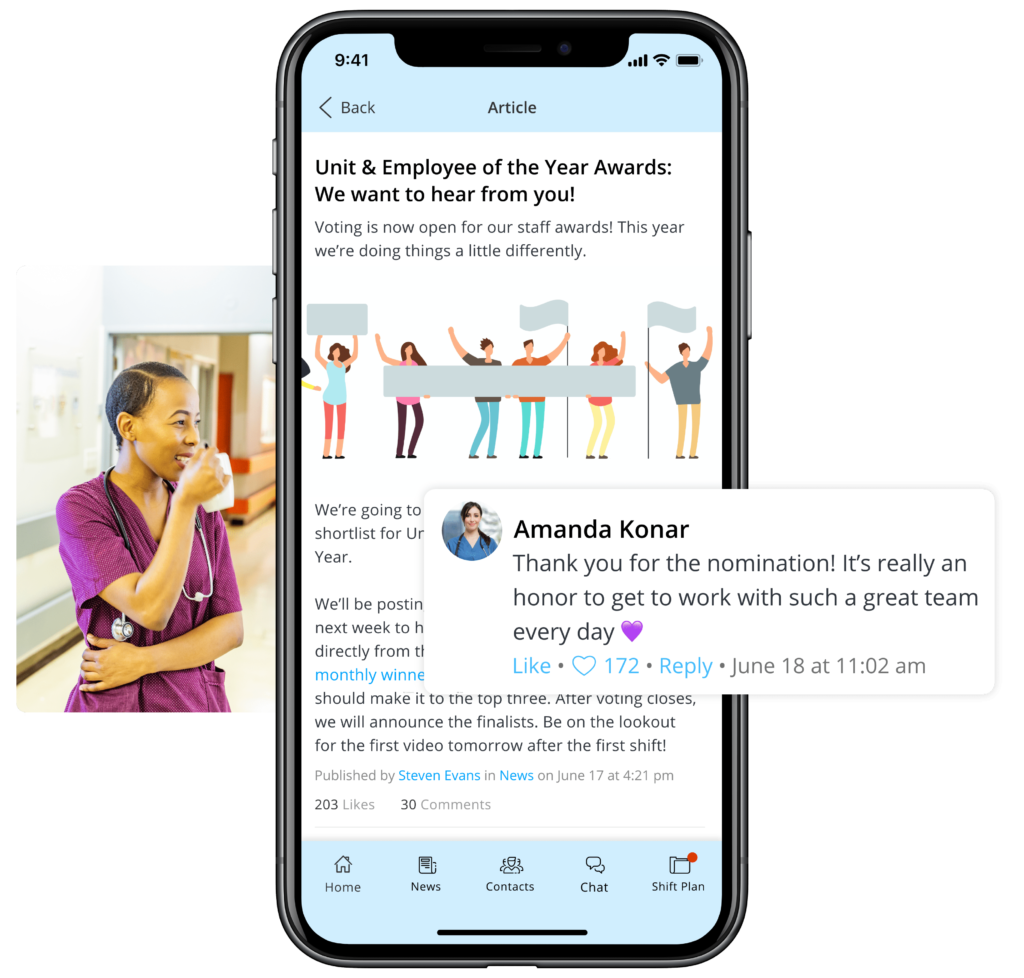
14. Encourage Innovation
Create avenues for employees to contribute ideas, experiment with new approaches, and implement creative solutions. An intranet focused on communication is ideal for such a purpose.
15. Support Continuing Education
Provide resources for ongoing learning, such as access to online courses, conferences, and industry events.
16. Promote Team-Building Activities
Organize team-building events, outings, or retreats to strengthen relationships and foster a sense of camaraderie.

17. Offer Flexible Benefits
Provide a range of benefits that cater to diverse employee needs, such as health and wellness programs, childcare assistance, or remote work options.
18. Create a Comfortable Workspace
Physical space is one of the three elements of the employee experience. Design an office environment that is conducive to productivity, creativity, and well-being. For remote employees, offering a home office stipend for basic necessities can have numerous benefits.
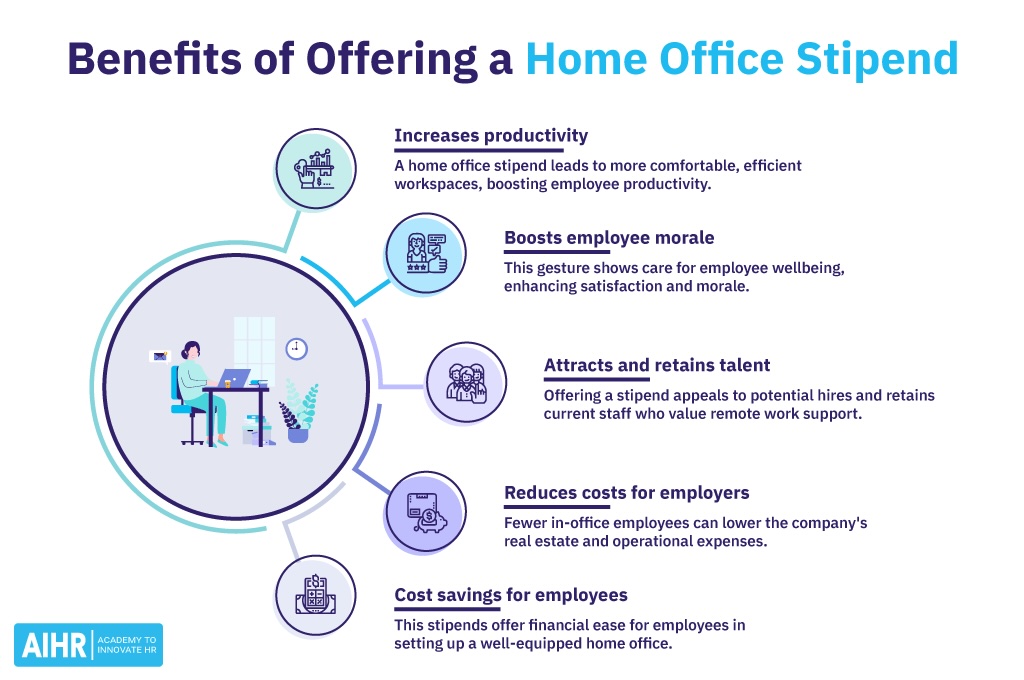
19. Encourage Volunteerism
Support employee volunteer efforts by offering paid volunteer time off or organizing company-wide volunteer events.
20. Share Success Stories
Highlight stories of employee success and innovation to inspire others and reinforce the organization’s values.
21. Promote Cross-Training
Encourage employees to develop skills outside of their primary roles through cross-training opportunities.
22. Implement Employee Feedback Mechanisms and Measure Their Success
Regularly solicit feedback from employees through surveys, focus groups, or one-on-one meetings, and take action based on their input.
23. Support Work-Related Passion Projects
Allow employees to pursue passion projects or side ventures related to their work within reasonable boundaries.
24. Offer Health and Wellness Programs
Provide resources and programs that support employees’ physical and mental well-being, such as fitness classes, meditation sessions, or counseling services.

25. Lead with Purpose
Clearly communicate the organization’s mission, vision, and values to inspire employees and give them a sense of purpose in their work. Of all the employee engagement ideas, none are more important.









